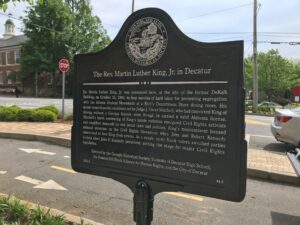 This week’s #MarkerMonday looks at The Rev. Martin Luther King, Jr., in Decatur historical marker in DeKalb County, the newest Georgia Historical Marker erected as an addition to the Georgia Civil Rights Trail. On September 23, 1960, Judge J. Oscar Mitchell sentenced Dr. King to twelve months of probation for driving without a license in May of that year, despite carrying a valid Alabama license. A month later, on October 25, 1960, King was brought before the same judge for protesting segregation with the Atlanta Student Movement in a Rich’s Department Store dining room. Judge Mitchell ruled that King’s participation violated his probation and sentenced him to four months of hard labor at the Georgia State Prison in Reidsville. This harsh ruling focused national attention on the Civil Rights Movement and racially motivated judicial decisions.
This week’s #MarkerMonday looks at The Rev. Martin Luther King, Jr., in Decatur historical marker in DeKalb County, the newest Georgia Historical Marker erected as an addition to the Georgia Civil Rights Trail. On September 23, 1960, Judge J. Oscar Mitchell sentenced Dr. King to twelve months of probation for driving without a license in May of that year, despite carrying a valid Alabama license. A month later, on October 25, 1960, King was brought before the same judge for protesting segregation with the Atlanta Student Movement in a Rich’s Department Store dining room. Judge Mitchell ruled that King’s participation violated his probation and sentenced him to four months of hard labor at the Georgia State Prison in Reidsville. This harsh ruling focused national attention on the Civil Rights Movement and racially motivated judicial decisions.
The hard labor sentences were typically carried out through chain gangs, a term for groups of prisoners chained together as they completed work outside of the prison. They were used for road construction, ditch digging, building repairs, breaking rocks, clearing trees, and farming. Beginning in Georgia in 1908, chain gangs resulted from the movement away from convict leasing and the high cost of keeping prisoners in a cell. The idea spread throughout the South during the 1920s and 30s. Typically, groups of five convicts were chained together, forcing them to work, travel, and sleep in their chained groups, causing sores and infections, and sometimes death.
John F. Kennedy (JFK) was running as the Democratic nominee for President in 1960. Black voters had traditionally voted Republican. Judge Mitchell’s move to suppress the Civil Rights Movement by imprisoning one of its leaders gave Kennedy the opportunity to publicly support the Movement. Senator Kennedy expressed his concern to Coretta King and privately reached out to Georgia Governor Ernest Vandiver for his assistance in getting King out of prison. JFK’s brother Robert Kennedy called the Judge to inquire about King’s bond, and he found out that one was never set. On Thursday, October 27, Judge Mitchell released King on bond, citing that it was mandatory under Georgia law. Sources informed King of JKF’s assistance and support spread throughout the Black community, helping Kennedy win the presidency.
Explore the links below to learn more:
The Martin Luther King, Jr. Research and Education Institute - Chapter 15: Atlanta Arrest and Presidential Politics
Commemorating King - A Decatur Story
PBS - Chain Gangs
New Georgia Encyclopedia - Martin Luther King Jr. (1929-1968)
Equal Justice Initiative - Race and the Criminal Justice System
Encyclopedia.com - Chain Gangs
Forced labor in the United States (1933) by Walter Wilson
"AP Was There: Martin Luther King Jr. sentenced to chain gang"
"John F. Kennedy, Martin Luther King Jr., and the Phone Call That Changed History"
